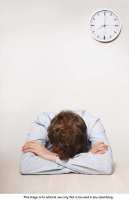The Economy Could Be Affecting Your Sleep Patterns

Posted by peter88
from the Careers category at
15 Jul 2011 10:18:24 pm.

One lesser known side effect of the sagging economy could be the negative impact it's having on the sleeping patterns of millions of men and women. In an effort to find any job that can help pay the bills or even keep their existing jobs, more and more men and women are willing to work any available shifts. This has caused men and women accustomed to a standard work schedule, be it 9 to 5 or 4 to 12 or overnight, to rotate work shifts. Men and women used to working 9 to 5, for instance, are finding themselves increasingly open to accepting a night shift one day and a day shift the next, all in an effort to land or keep a job.
While this flexibility is understandable, it could be making individuals more susceptible to a sleeping disorder known as Shift Work Sleep Disorder, or SWSD. SWSD can affect people who frequently rotate shifts or work at night. Such changes go against the body's natural circadian rhythm, and men and women often struggle to get a decent night's sleep as a result.
The American Sleep Association notes that the circadian rhythm operates on a nearly exact 24 hour cycle, governing when the body should feel tired or alert and when a person should eat and perform other tasks. This is a natural cycle, and one that exists in plants and animals as well. When this rhythm is consistently interrupted, as it is when a person frequently rotates shifts at work, the side effects are numerous and can make it very difficult for men and women to function properly.
Symptoms of SWSD
The most common symptoms of SWSD are excessive tiredness and insomnia. When a person is excessively tired, no aspect of their life is likely to go unaffected. A person dealing with SWSD will have difficulty concentrating and lack energy. This is especially troubling, as shift work positions exist in nearly every sector and often demand a worker's concentration and alertness. Manufacturing positions, which often put workers' lives in danger, are the first thing that comes to mind when thinking of shift work jobs. However, doctors, nurses, police officers, and firefighters are additional professions that utilize shifts. Excessively sleepy doctors who are struggling to concentrate can be a frightening prospect, as is an auto plant worker who's struggling to stay focused on the job.
Side Effects of SWSD
An increase in accidents is one of the major side effects of SWSD. It only stands to reason that an excessively tired worker, whatever his or her profession, may be more prone to accidents.
Another side of SWSD is irritability and mood problems. Men and women who are not getting adequate sleep are more likely to be irritable and moody.
Dealing With SWSD
The sagging economy has forced many people to accept SWSD. After all, many are willing to sacrifice a good night's sleep in order to keep a roof over their family's heads and food on the dinner table. However, men and women who plan to continue rotating shifts or taking overnight shifts need to recognize the importance of making sleep a priority. The American Sleep Association recommends people consult their doctor or a sleep specialist for advice of reducing the effects of circadian rhythm sleep disorders.
Another approach is to consult family members and ask for their help in creating a quiet and peaceful setting in which you can sleep. In homes with young children, this can include informing children that the house must remain quiet while Mom or Dad are asleep. This involves avoiding noisy activities like vacuuming, washing dishes or hosting guests.
SWSD has become a reality for men and women forced to work any shift to support their household in a trying economic time. To learn more about SWSD, visit the American Association at www.sleepassociation.org.
1 Comments
Comments




hi